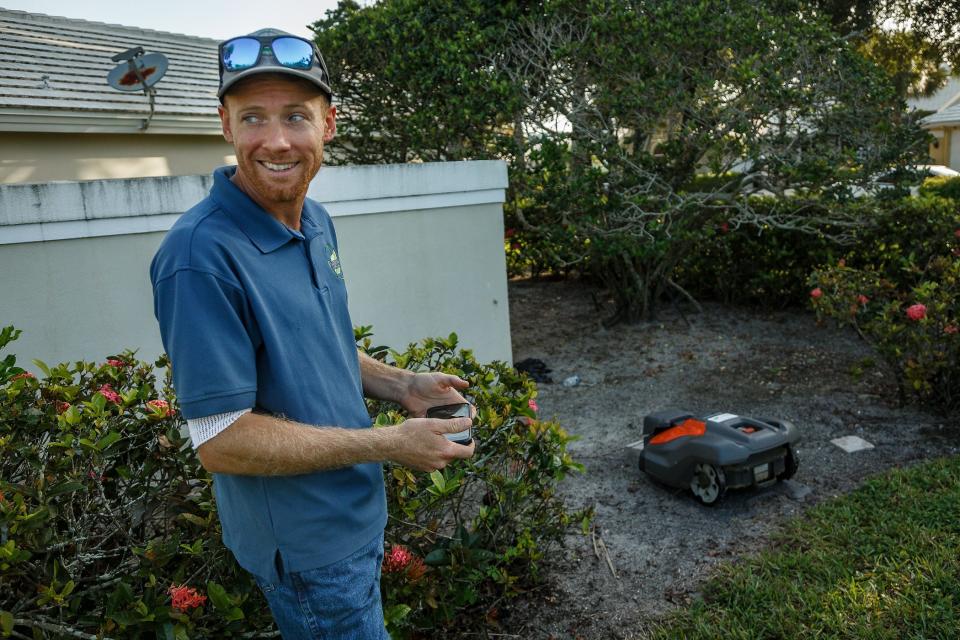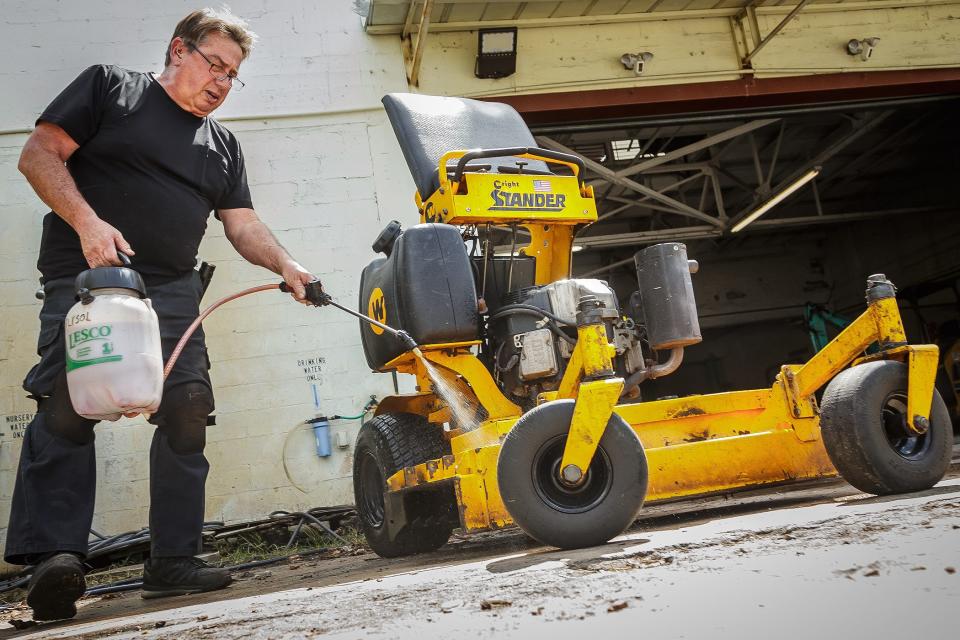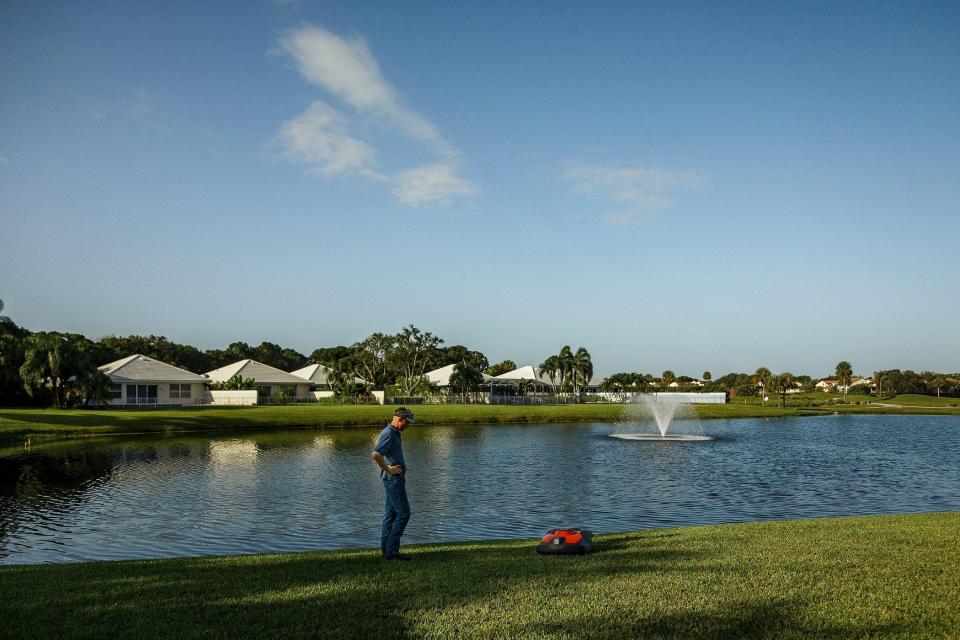How robot lawn mowers in one West Palm Beach community help fight climate change
An hour past a blistering August sunrise, a lawn mower named Rosie is silently cutting grass in the gated Bear Island community with a surgeon’s precision, but without oversight, complaint or a drop of sweat.
Named for the robot housekeeper in the animated television series "The Jetsons," Rosie is a Husqvarna 550 H Epos autonomous electric mower outfitted with a wireless control system, satellite mapping and 3-inch-long pivoting razor blades.
Florida Image Landscape co-owner Tyler Reiter installed three Rosies at Bear Island in West Palm Beach. He also set up one at billionaire developer Jeff Greene’s Palm Beach house, and another at the estate of a high-profile client who isn't keen on frequent visits by an army of yard workers.
The mowers, which weigh between 20 and 30 pounds, help save time for Reiter’s seven-member grass crew in Bear Island.
They also help save the environment from noise and air pollution.
More: Lethal viral necrosis is killing Florida's St. Augustine grass and there's no fix
According to the U.S. Department of Energy, gas-powered lawn mowers use 1.2 billion gallons of gasoline nationwide each year, which is about 1% of the country’s annual gasoline consumption. The Environmental Protection Agency estimates that gas-powered lawn and garden equipment in the U.S. produced 17% of the smog-forming pollutants, such as nitrogen oxides, from all mobile sources in 2022.

“This is the future. It’s coming whether we like it or not,” said Reiter, who compares the mowers to robot vacuums, such as Roomba. “You aren’t getting rid of the human touch. They’re just helping us.”
Robot mowers have been around for at least two decades, but the technology was clunky, the machines were expensive and it was unclear how they would handle Florida’s ever-growing grass.
Because they were originally developed for the European market’s cool-season grasses, most mowers are set to cut grass at heights lower than 3.5 inches, according to a University of Florida study published this month in the journal HortTechnology.
More: Breadfruit trees were thought to grow only in the Keys but a warming world is changing that
But Florida’s coarser St. Augustine grass likes to be left long, usually 3.5 to 4 inches, said study co-author J. Bryan Unruh, who is a professor and associate director at UF’s West Florida Research and Education Center.
The two-year study compared grasses mowed at 2.5 inches by a robot mower to those mowed at 3.5 inches by a traditional mower.
“Surprisingly, the results were really good,” Unruh said. “The grass can be cut at the lower height when it’s mowed daily, and the quality is better because they are just nibbling off a little bit of leaf blade at every cutting.”
Unlike the once or twice-weekly trims most people give their lawns, autonomous mowers are deployed every day, taking breaks if they register a low battery by returning on their own to waterproof charging stations. The sharp-edged blades leave a cleaner cut than traditional mowers that can chew up grass and leave them frayed and brown at the edges. In the UF study, robot-mowed grass stayed green even during the cooler months while the grass mowed by a traditional mower turned brown.
Also, robot mowers stay on their home properties, preventing the spread of grass-killing diseases such as lethal viral necrosis that can cling to landscape mowers when they move from community to community. Because they are trimming millimeters each day, the clippings quickly decompose so there's no thatch buildup, Unruh said.

Older-model robot mowers would roam randomly inside areas contained by boundary wires, like an invisible dog fence. Newer models are more precise, memorizing their routes so they don’t repeat sections.
Billionaire Greene has older models in Palm Beach and at his estate in the Hamptons. He said his wife adores them, but he finds them a little "freaky" when he looks out his window and sees motion in his backyard.
"The lawn looks great," Greene said. "Personally, it can be kind of annoying sometimes trying to get in the house when they are out moving around."

How much do robotic lawn mowers cost?
The machines range in cost from a few hundred dollars to several thousand dollars, and that doesn’t include installation. Reiter said the upfront effort of programming the mowers for their specific tasks is 80% of setting them up.
More: Florida developers criticized for urban sprawl but Avenir is restoring natural habitat too
Reiter can drive them with his phone if he has to, or set them up so he can use a video-game controller.
“The first question always is, ‘Is it safe around my kids and dogs?’ ” said Reiter, who also can monitor his mowers from his phone. “If the shell bumps into something, or senses something, it stops. If it gets stuck and can’t get unstuck, it sends out a text message.”
In the future, Florida landscapes may be redesigned to better accommodate the robot mowers, Unruh said.
For example, raised flower beds with borders pose a problem for the mowers because the blades can only reach 4 to 6 inches from the center of the machine. That means a human still needs to come and use an edger to cut near the border for a clean look.
“Versus, let’s say we sink our beds so the mower can reach over that edge and clip the grass,” Unruh said. “The Europeans are way ahead, and their landscape design is evolving.”
Photos: Beautiful blooming trees and flowers signal the start of Summer
The market for robot lawn mowers in the United States was valued at about $351 million in 2021, according to research firm Arizton. It is expected to reach $704.5 million by 2027.
California was the first state in the country to ban the sale of most gas-powered leaf blowers and lawnmowers following a 2021 law that aimed, in part, to ease greenhouse gas emissions. The ban begins with model year 2024 products, accord to a Wall Street Journal article.
In Palm Beach: Town moves to ban gas-powered leaf blowers, extends overnight quiet time
But not everyone is sold on the robots.
Scott Lewis, who owns West Palm Beach-based Scott Lewis' Gardening and Trimming, said the battery-powered landscape tools he uses to reduce noise in some neighborhoods are triple the cost of gas-powered ones.
His crews have to carry multiple batteries for their machines, and sometimes search for plugs to recharge them.
"For a homeowner, this is something that I'm sure will further develop in the future," he said. "But for any kind of commercial operation, forget it."
Reiter thinks he can change that.
His mowers in Bear Island have knobbier tires to keep them from sliding into drainage ponds, and they cut St. Augustine grass at the preferred 3.5 inches. He's also working on building a solar-powered version.
The auto mowers trim just over 3 acres of the common areas in Bear Island. So far, there's been few hiccups, but one resident said jokingly that the Rosies may be chafing at working on Sundays.
He thinks they may be starting a union.
Kimberly Miller is a veteran journalist for The Palm Beach Post, part of the USA Today Network of Florida. She covers real estate and how growth affects South Florida's environment. Subscribe to The Dirt for a weekly real estate roundup. If you have news tips, please send them to kmiller@pbpost.com. Help support our local journalism, subscribe today.
This article originally appeared on Palm Beach Post: West Palm Beach homeowners association hired robots to cut its lawns

